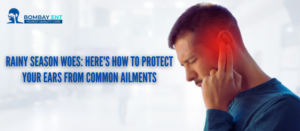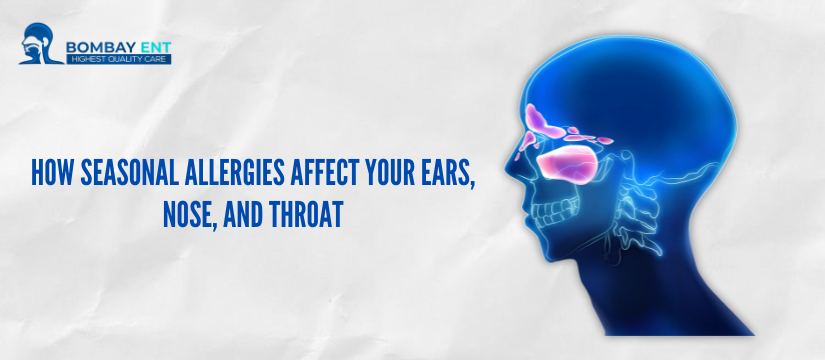 As the rainy season rolls in, it brings with it the joy of refreshing showers and the soothing sound of rain. However, this season also poses several health challenges, particularly for our ears. The increased humidity and dampness create a breeding ground for bacteria and fungi, leading to various ear problems. Protecting your ears from common ailments during the rainy season is crucial to ensure you enjoy the season without discomfort. Let’s delve into this blog for more information about how to safeguard your ears and enjoy the rainy season to the fullest.
As the rainy season rolls in, it brings with it the joy of refreshing showers and the soothing sound of rain. However, this season also poses several health challenges, particularly for our ears. The increased humidity and dampness create a breeding ground for bacteria and fungi, leading to various ear problems. Protecting your ears from common ailments during the rainy season is crucial to ensure you enjoy the season without discomfort. Let’s delve into this blog for more information about how to safeguard your ears and enjoy the rainy season to the fullest.
Understanding the Rainy Season and Ear Health
The rainy season, characterized by heavy rainfall and increased humidity, can significantly impact ear health. The warm and moist environment promotes the growth of pathogens that can lead to infections. Additionally, getting caught in the rain or swimming in contaminated water can expose your ears to harmful bacteria. Understanding these risks is the first step in preventing ear ailments during this season.
Common Ear Ailments During the Rainy Season
Otitis Externa: Commonly known as swimmer’s ear, this condition occurs when the ear canal gets infected. The combination of moisture and bacteria makes it a frequent issue during the rainy season.
Middle Ear Infections: Rainy weather can increase the risk of upper respiratory infections, which can lead to middle ear infections. Symptoms include ear pain, fever, and hearing loss.
Fungal Infections: The warm and humid environment is ideal for fungal growth. Fungal infections in the ear can cause itching, discharge, and discomfort.
Symptoms to Watch For
Being aware of the symptoms of ear infections can help in early detection and treatment. Look out for signs such as:
- Ear pain or discomfort
- Itching in the ear canal
- Fluid discharge from the ear
- Reduced hearing
- A feeling of fullness in the ear
- Swelling or redness around the ear
If you experience any of these symptoms, it’s essential to consult a healthcare professional promptly.
Preventive Measures to Protect Your Ears
Keep Your Ears Dry
Moisture is a primary culprit in ear infections. After exposure to rain or water activities, ensure your ears are thoroughly dried. Use a clean towel to gently pat the outer ear dry. Avoid inserting objects like cotton swabs into the ear canal, as this can push moisture further in.
Use Earplugs
Wearing earplugs while swimming or during heavy rain can prevent water from entering the ear canal. Silicone earplugs are particularly effective as they provide a waterproof seal. Remember to clean and dry your earplugs after each use to avoid contamination.
Avoid Using Earphones or Earbuds
Prolonged use of earphones or earbuds can trap moisture and bacteria in your ears, increasing the risk of infection. Opt for over-the-ear headphones if you need to listen to music or take calls during the rainy season.
Maintain Ear Hygiene
Regularly clean your ears with a gentle solution recommended by your healthcare provider. Avoid using sharp objects to clean your ears, as they can damage the delicate ear canal and eardrum. If you experience excessive earwax buildup, seek professional help.
Boost Your Immune System
A strong immune system can help your body fight off infections more effectively. Maintain a balanced diet rich in vitamins and minerals, stay hydrated, get adequate sleep, and engage in regular physical activity. These habits can enhance your overall health and protect against ear infections.
When to Seek Medical Attention
While home remedies and preventive measures are often effective, some situations require professional medical intervention. Seek medical attention if you experience:
- Severe ear pain that doesn’t improve
- Persistent fluid discharge
- Hearing loss
- Fever or chills
- Swelling or redness around the ear
Early treatment can prevent complications and ensure a swift recovery.
Importance of Regular Check-Ups
Regular ear check-ups can help detect and address potential issues before they become serious. Schedule an appointment with an ENT specialist in mumbai, especially if you’re prone to ear infections. They can provide personalized advice and treatment options to keep your ears healthy.
Lifestyle Changes for Ear Health
In addition to specific measures, adopting certain lifestyle changes can significantly improve your ear health during the rainy season and beyond.
Avoid Smoking
Smoking and exposure to secondhand smoke can irritate the Eustachian tube and increase the risk of ear infections. Quitting smoking not only benefits your ear health but also improves your overall well-being.
Manage Allergies
Allergies can cause inflammation and fluid buildup in the ears. Managing allergies through medication or avoiding allergens can reduce the risk of ear infections.
Stay Hydrated
Adequate hydration helps maintain the fluid balance in your body, including the fluids in your ears. Drink plenty of water throughout the day to keep your body and ears hydrated.
FAQs
1. How can I prevent ear infections during the rainy season?
Ans: To prevent ear infections, keep your ears dry, avoid using earphones for prolonged periods, use earplugs when necessary, and maintain good ear hygiene. Boosting your immune system through a healthy diet and regular exercise can also help.
2. What are the common symptoms of ear infections?
Ans: Common symptoms include ear pain, itching, fluid discharge, reduced hearing, and a feeling of fullness in the ear. If you experience these symptoms, consult a healthcare professional.
3. Can I swim during the rainy season?
Ans: Swimming during the rainy season is possible if you take precautions such as wearing waterproof earplugs and ensuring the swimming water is clean. After swimming, dry your ears thoroughly to prevent infections.
4. When should I see a doctor for ear problems?
Ans: Seek medical attention if you experience severe ear pain, persistent fluid discharge, hearing loss, fever, or swelling around the ear. Early intervention can prevent complications.
5. How often should I have my ears checked by a doctor?
Ans: Regular check-ups with an ENT specialist are recommended, especially if you are prone to ear infections. They can provide personalized advice and detect potential issues early.
Conclusion
The rainy season, while refreshing and enjoyable, comes with its own set of challenges, particularly for ear health. By understanding the common ear ailments and taking preventive measures, you can protect your ears from infections and discomfort. Simple steps such as keeping your ears dry, using earplugs, and maintaining good hygiene can make a significant difference. Additionally, adopting a healthy lifestyle and diet can support your overall ear health. For expert guidance in natural ear health solutions, you may want to consult with Dr. Maqsood Ali Khan. Stay vigilant, take care of your ears, and enjoy the rainy season without worries


